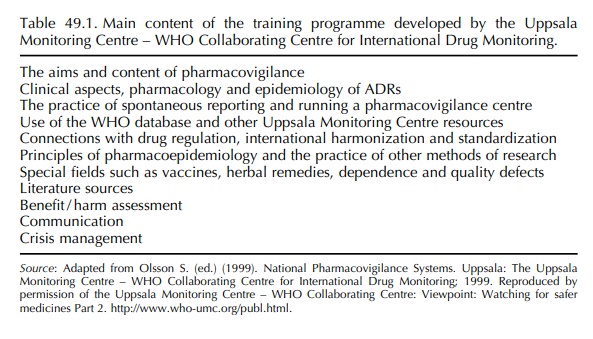Teaching Pharmacovigilance
| Home | | Pharmacovigilance |Chapter: Pharmacovigilance: Teaching and Learning Pharmacovigilance
For all healthcare disciplines involved with prescribing, administering and monitoring effects of pharmacotherapies, there is a well-recognized body of knowledge seen as being necessary for professional practice.
TEACHING PHARMACOVIGILANCE
AT UNDERGRADUATE LEVELS
For
all healthcare disciplines involved with prescribing, administering and
monitoring effects of pharmacotherapies, there is a well-recognized body of
knowledge seen as being necessary for professional practice. This body of
knowledge has its basis in studies of human behaviour including communication,
ethics and philosophy; physiology, patho-physiology, clinical and laboratory
sciences including pharma-cology. Preparation for practice in medicine,
nurs-ing, pharmacy, dentistry and other such professions requires admixtures of
each of these disciplines to a greater or lesser degree depending on the
profession itself and the scope and nature of subspecialisation.
Building
onto these basic health sciences, pharma-cotherapeutics education needs to be
solidly grounded on principles of benefit and risk from drug therapies. This
paradigm of benefit and risk needs to be the foun-dation for understanding of
both absolute and relative effects of medicines used in therapeutics.
The
judicious and effective management of the benefits and risks of pharmacotherapy
then needs to be taught as a key skill to be mastered by all health
professionals. Whilst differing health professions in different settings will
have different roles to play in this management process, the concept of
benefit/risk management is fundamental to sound preparation for practice in any
of the disciplines that are involved in pharmacotherapy processes.
The
current structure, methods and operational imperatives of the global
pharmaceutical industry also need to be taught to undergraduates in an open and
unexpurgated fashion. The real benefits to humanity from this enterprise need
to be projected clearly in the context of the inevitable risks to health, which
also accompany the benefits.
Coupled
with the paradigm of benefits and risks of drug therapies, the undergraduate
health professional needs to be instructed at the outset in the realities of
both error and uncertainty in health care. Tech-niques for purposefully dealing
with error and person-ally managing the breadth of uncertainty involved in
ongoing healthcare practice need to be instilled at the earliest opportunity.
Equally, the complex nature of the public’s expectations for ‘safety’ of
pharmaceuti-cals needs to be the backdrop against which evolving knowledge of benefits and risks of medicines
will always be viewed.
In
this context, each of the professions participat-ing in pharmacotherapy needs
to leave the under-graduate setting with expectations of a future lifelong
learning experience. Suggestions for effective adult learning in the field of
pharmacovigilance have been outlined above.
Building
on this approach to pharmacotherapy at the undergraduate level,
pharmacovigilance and a contin-ually refreshed knowledge of benefits and risks
from pharmacotherapy can become central to the experi-ence of all healthcare
clinicians.
The
benefits of ongoing pharmacovigilance research will only be able to be fully
realized when healthcare practitioners have consistent expectations for this
ongoing learning experience.
AT POSTGRADUATE LEVELS
Pharmacovigilance
professionals are generally drawn from a wide range of disciplines not all of
which necessarily have a basis in the health professions. In particular,
statisticians and computing profession-als are key personnel needed for
effective operation of large-scale spontaneous reporting systems as well as for
the increasingly important activity of mining large data sets of longitudinal
healthcare records for pharmacovigilance intelligence.
A
range of educational authorities in different countries have developed and
continue to deliver valuable educational programmes for professionals working
within the discipline of pharmacovigilance itself.
The International Society of Pharmacovigilance (ISOP: http://www.isoponline.org) is a non-profit organization whose stated aims are to foster Phar-macovigilance both scientifically and educationally, and enhance all aspects of safe and proper use of medicines, in all countries. Educational courses in pharmacovigilance principles are periodically avail-able through ISOP, which acts as a key global meet-ing place for those specifically engaged in collecting, assessing and disseminating information about risks of medicines in broad use in whole populations.
Another
organization having a rather broader remit for the evaluation of both benefits
and risks of pharmacotherapies is the International Society for
Pharmacoepidemiology (ISPE: http://www.pharmacoepi.org). ISPE is an inter-national organization dedicated
to advancing the health of the public by providing a forum for the open
exchange of scientific information and for the development of policy;
education; and advocacy for the fields of pharmacoepidemiology and therapeutic
risk management. ISPE has developed important guidelines for good pharmacoepidemiological practice (Epstein,
2005). Greater confidence can be placed in inferences drawn from observational
studies of drug benefit and risk when such studies conform to these guidelines.
The guidelines are now formally recog-nized in many countries by reference in
Government regulatory requirements. International Society for
Pharmacoepidemiology also provides periodic training courses and educational
programmes both in sound pharmacoepidemiological methods and, more recently, in
therapeutic risk management.
There
are many other authorities that provide disci-plined training for professionals
who work specifically in the fields of pharmacovigilance and therapeu-tic risk
management: e.g. the Drug Information Association (DIA:
http://www.diahome.org); The United Kingdom Drug Safety Research Unit (DSRU:
http://www.dsru.org) and the London School of Hygiene and Tropical Medicine
(http://www.lshtm.ac.uk/courses). The European Agency for the Evaluation of
Medicinal Prod-ucts (EMEA: http://eudravigilance.emea.eu.int) in collaboration
with the DIA is now also providing training for pharmacovigilance
professionals. These DIA programmes are particularly relevant for
pharma-covigilance professionals who work within the pharmaceutical industry.
Pre-eminent
and leading for many years in this field of education for professional
pharmacovigilists has been the World Health Organization Collaborat-ing Centre
for International Drug Monitoring. This remarkable centre now located in
Uppsala, Sweden, has since the 1960s been active in setting global operational
standards for public health–oriented phar-macovigilance activities (WHO, 2004).
Staff from this centre have developed benchmark training programmes, which
since 1993 have inspired and fed the development of many national spontaneous
ADR reporting systems around the world (Table 49.1).

Table
49.1 provides a summary of curricular mate-rials included in training
programmes of the Uppsala Monitoring Centre. These programmes are regularly
delivered both in Sweden and also periodically in different parts of the world.
Related Topics
